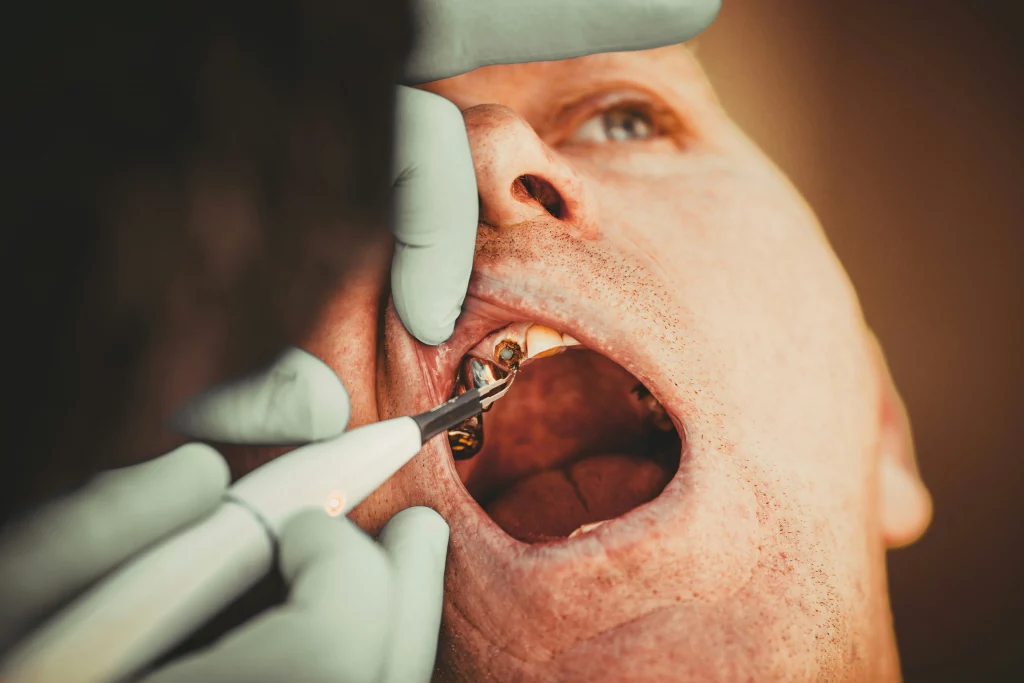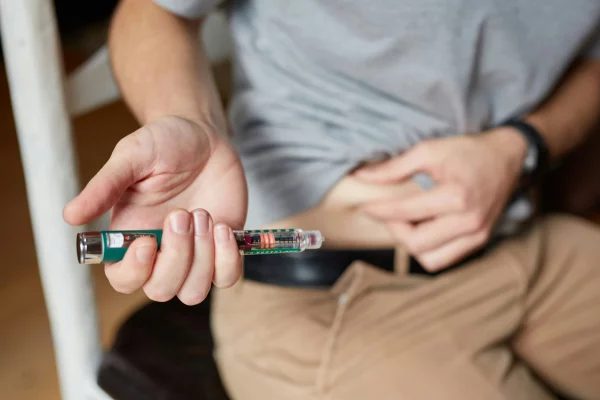Tooth replacement using dental implants has changed the way to replace teeth- even in medical cases such as diabetes. As a diabetic person, you might be wondering whether dental implants are safe and effective to you. The bright side is that they could be a good idea, and, given the right planning and maintained blood sugar, dental implants are a valid option. We will look at some of the dominant determinations of whether one will succeed in the course, how to prepare and what you should know prior to offering yourself to treatment in this article.
Can Diabetics Get Dental Implants Safely?

Dental implants have transformed the process of replacing teeth even in patients who have medical issues such as diabetes. But if you have diabetes, you may be concerned whether implants are risky or not. The silver lining is that, when undergoing careful and controlled planning, blood sugar and controlling, the dental implants can be dependable.
How Diabetes Affects Oral Healing and Bone Integration
Sugar in the blood will cause hindrance in blood circulation, reduce immune system strength, and lead to prolonged bone growth, all which may complicate the process of dental implants healing. The jawbone has to bond strongly to the titanium surface of the implanted. This vital bond may be broken down by poor circulation or infection. You can increase your odds by having stable glucose control pre-operative, intra-operative and post-operative.
Ideal Blood Sugar Levels for Implant Candidacy
Most dental professionals target certain glucose levels in order to facilitate a positive healing process. Your HbA1c levels, ideally, should be below 7 percent and less would give you even better results. Fast glucose level before the operation must be between 80-130 mg/dL and postprandial level low than 180 mg/dL. Your dentist or oral surgeon will attentively examine your test results in the lab and where required liaise with your affiliated endocrinologist with a view to perfecting your glucose levels prior to proceeding with the implant procedure. This synergistic effort allows reducing complications and promoting a long-term implant success.
When Implants Are Not Recommended for Diabetic Patients
In some cases dental implants might require being delayed or avoided altogether. They are sustained HbA1c range of 8.5 or above, active gingivitis, severe bone loss, autoimmune disorders, extensive use of medication, common infections or kidney disease. All these predispose to failure or incomplete healing of the implants. Nonetheless, most patients with such difficulties would always attain success through the well-disciplined treatment regime, observation, and proper time. Your dental crew will also consider your general health and develop an individual approach that will enhance your chances of success.
Dental Implant Success Rates in Diabetic Patients
Uncontrolled diabetes may influence healing and put a person at risk of developing complications related to dental implants. Studies however, indicate that diabetes does not affect implant outcomes adversely when good management of blood sugar is maintained since diabetes patients have equal implant rates with non-diabetics. Success rates in patients with controlled Type 2 diabetes have been reported successfully in 90 percent or more categories of studies. The trick is to maintain a steady level of glucose during and after the procedure as well as before the procedure.
The other factors such as quality of bones, gum condition, and oral hygiene also play a significant role. With a synchronized effort of your dentist, physician and perhaps an endocrinologist much can be done to reduce risks and enhance better results. When surrounded properly and incorporated into proper maintenance, diabetic patients are capable of long-run success and better oral functionality through dental implants.
Studies Comparing Diabetic vs. Non-Diabetic Outcomes
Currently, the patient reviews demonstrate that the overall success rate of dental implants among the diabetics is reported as 90 to 95% which is similar with the success rate of non-diabetics, provided the blood sugar levels are within the desirable limits. Even a meta-analysis of 2023 observed comparable osseointegration and follow-up results in both patient groups, as long as they had a good glycemic control and proper pre- and post-surgery care. This points out the importance of synchronized management and preparation to the achievement of a permanent outcome even by individuals with chronic illnesses such as diabetes.
Type 1 vs. Type 2 Diabetes and Implant Performance
The risks associated with dental implants are roughly similar in diabetic patients of type 1 and type 2 provided that their glucose that is well-controlled. Nevertheless, research studies indicate that patients that have Type 1 diabetes are a bit slower to heal owing to base autoimmune phenomena. Nonetheless, the most important success determinants are achieved individually, irrespective of diabetes type, and include thorough and proper oral care, personal monitoring, and excellent collaboration with health professionals.
How to Minimize Risk of Implant Failure
To reduce the chances of the failure of the dental implant, you must make sure that your blood glucose levels remain stable both during and after the operation. Healing is also dependent on the fact that any gum disease is treated and controlled prior to the healing process. A patient should maintain a good oral hygiene, stop smoking, continue to visit a dentist regularly and have his teeth cleaned, (at least after the surgery) and these factors are important to the success of the implant in the long term.
Preparing for Dental Implants with Diabetes

Successful dental implants are possible in case you have diabetes with proper preparation. The initial one is to level out your glucose in the bloodstream, possibly to HbA1c <7 %. Your dental crew will be in touch with your main physician or endocrinologist to check lab outcomes and assure you are ready mentally. Gum disease must be addressed earlier and a bone scan can be required to determine the health of the jawbones. You will also undergo complete examination of heart and dental examination to design a safe surgery. As soon as your oral and systemic health are under control, you considerably increase the opportunities to succeed with implants.
What Tests to Do Before Implant Surgery
Prior to acquiring the dental implant, a number of tests will be done to check whether your body is prepared to heal successfully or not. Tests that determine the level of control over your diabetes include tests on blood such as HbA1c and fasting glucose level tests. X-rays are usually done through an imaging test like CBCT scan that checks the quality and the density of your jawbone. Prior to treatment, a complete dental examination is done to determine the presence of acute infections or gum diseases which must be treated.
Moreover, your dentist can demand medical approval or a letter by your endocrinologist. Collectively, such measures facilitate a clear image of your general well-being and contribute to the safe, individual approach to treatment.
Coordination Between Endocrinologist and Dentist
It is vital that your endocrinologist talks with your dental personnel. With collaboration of both specialists, they may develop a collaborative care plan that will make your blood sugar stable prior to the implant surgery, during implant surgery, and after implant surgery. This organization aids in the minimization of complications, a chance to approaches medications properly, as well as assists in improved healing achievements. When you have open communication, the experience of dental implant will be easier, safer and much more meeting your health requirements.
Medications That May Interfere with Healing
Some diabetes, high blood pressure, or blood-thinning medication might affect your healing following the implant procedure. This is the reason why you should provide your dentist with the entire list of the medication. This will enable them to change healing regimes, use the correct antibiotics, and schedule the process at the right time according to your medication order to facilitate an easy and safe recovery.
Post-Implant Care Tips for Diabetic Patients

Diabetic patients can add some special care after having dental implants installed in order to support the healing process and to prevent adverse complications. Maintain blood sugar levels at target range, more so, during initial weeks after surgery. Adhere to all the oral hygiene protocols to the latter-brush lightly, use specified rinsing material, and do not harm the site. Consume balanced, soft foods that do not stimulate the blood sugar level and keep the body hydrated.
The follow-up visit are your checked up visits and they should not be missed because your dental team will check up your progress in healing and step on trouble where you are getting into difficulties early. In case you feel a strange pain, swelling or discharge, you should rush to your dentist.
Monitoring Blood Glucose During Recovery
Your glucose levels should be within control during both fasting and after the feeding time as any imbalance during the initial healing process may slow the process or expose you to infections. In case you have increased-than-usual readings during the first two weeks, go to your physician at the earliest opportunity so that the care plan can be revised without leading to complications.
Special Oral Hygiene Routines to Follow
To facilitate the best healing, diabetic cases require special oral care regimens following surgerical dental implants. Gently brush the teeth with a soft-bristled toothbrush twice a day (pay special attention to the area of the implant). The first week commonly includes prescription of an antimicrobial mouth rinse, most commonly chlorhexidine to minimize bacterial load. Clean around the implant by daily flossing, or with the help of an oral irrigator. Also make sure that you have professional dental cleanings after every 3-4 months during the period of healing to make sure that the place is not infected and in good condition.
Recognizing Signs of Implant Complications Early
Look out of warning symptoms that could be an indication of complications to occur after dental implant surgery. When you have persistent pain even after the first week, swelling, abnormal bleeding or discharge as well as bad taste in your mouth, this may be indication of infection or improper healing. The relaxation of the implant, swelling lymph nodes, and swelling in particular are known to be red flags. In case you develop any of the above symptoms, do not hesitate to call your dentist to facilitate quick examination and treatment. Immediate treatment will avert worse complications and allow avoiding complications in the success of the implant.
Frequently Asked Questions (FAQs)
1. Can I get dental implants if I have uncontrolled diabetes?
Uncontrolled diabetes increases the risk of complications, but it doesn’t automatically rule out dental implants. The key is managing your blood sugar first. Your dentist and healthcare provider may recommend reducing your HbA1c to a safer range, typically under 7–7.5%. Once your blood sugar is stable, implant treatment becomes a safer option. A staged approach may be used, giving your body time to heal and respond well. This helps ensure the best possible outcome for long-term success.
2. What are the risks of dental implants for diabetics?
Diabetic patients face higher risks of infection, slower healing, and implant failure if blood glucose isn’t well-controlled. Poorly managed diabetes can also make gum tissue more prone to inflammation, increasing the chance of complications. Gum disease, which is more common in diabetics, may further hinder the healing process. However, these risks can be significantly reduced. When blood sugar levels are stable, oral hygiene is excellent, and the implant procedure is carefully planned, many diabetic patients experience successful outcomes. Collaboration between your dentist and physician is essential for safe and effective treatment.
3. How can I prepare for implant surgery if I’m diabetic?
Preparation begins by stabilizing blood glucose levels, addressing any existing gum disease, and confirming bone health with scans. Your medical history will be reviewed thoroughly, and lab tests may be required to assess readiness. A coordinated care plan between your dentist and endocrinologist ensures all health factors are considered. Maintaining both oral and systemic health at the time of surgery is essential for a successful implant outcome. This proactive approach greatly improves healing and reduces the risk of complications.
4. Will insurance cover implants if I have diabetes?
Coverage for dental implants depends more on the specifics of your dental insurance plan than on your diabetes status. While some medical insurance may help if tooth loss is tied to a medical condition, most implant-related costs fall under dental coverage. Since plans vary widely, it’s essential to contact your provider and confirm what’s included before beginning treatment. This avoids unexpected out-of-pocket expenses and helps you plan more effectively.
5. How long is the healing process for diabetics?
Healing from dental implants typically takes about 3 to 6 months. For patients with well-controlled diabetes, this process often mirrors that of non-diabetic individuals. However, if healing progresses more slowly, your dentist may recommend a two-stage approach, placing the implant first, allowing it to fully integrate, and then attaching the crown later. This method gives the body more time to adjust and reduces the risk of complications. Regular follow-ups will help ensure you’re healing as expected.
If you’re diabetic and considering dental implants, know that success is within reach when your health is well-supported. Working with a dental team experienced in implant procedures and with your medical provider close at hand makes all the difference.
Schedule a consultation today to assess your candidacy, review test requirements, and design a customized plan that respects your unique needs. With careful preparation and skilled follow-up, you can enjoy the confidence, function, and quality of life that dental implants provide.


